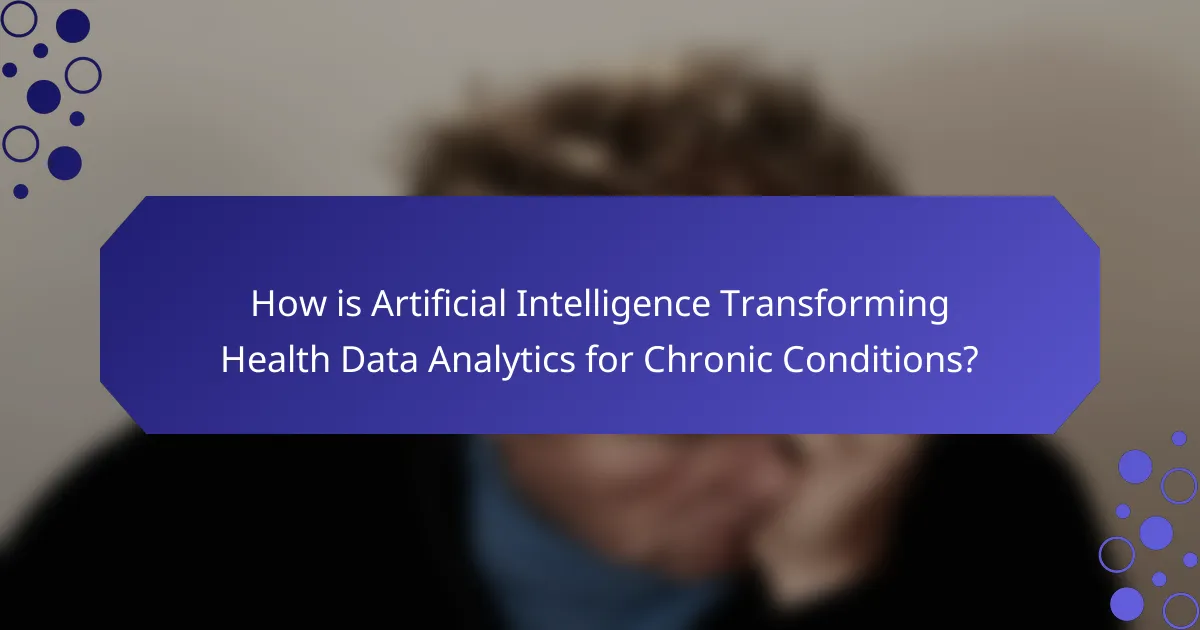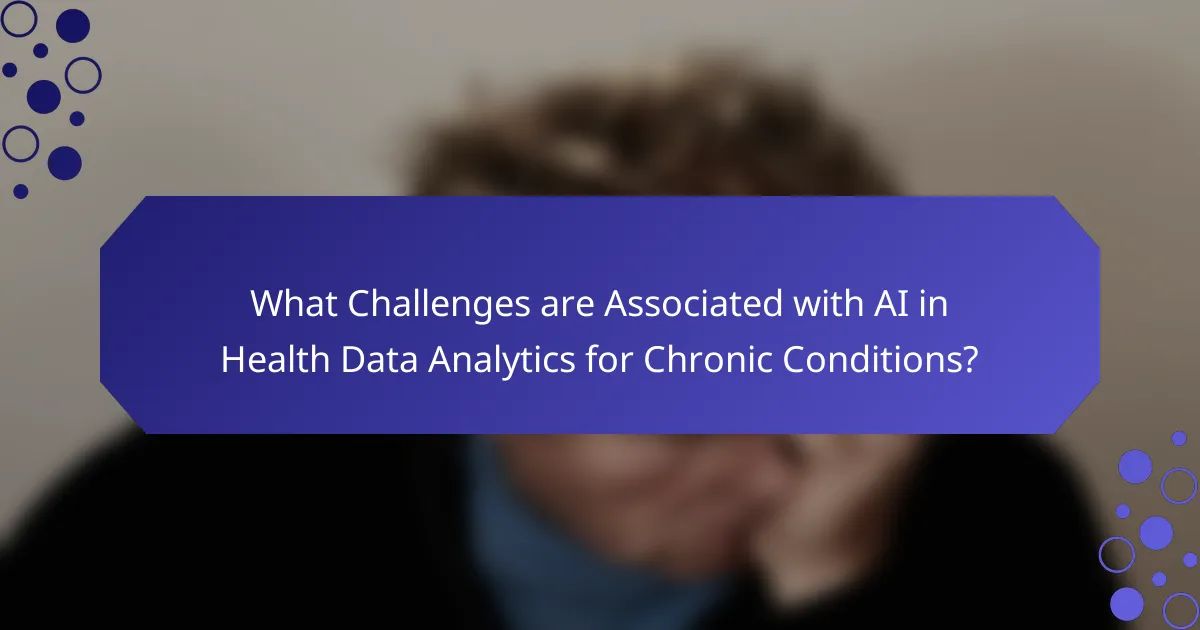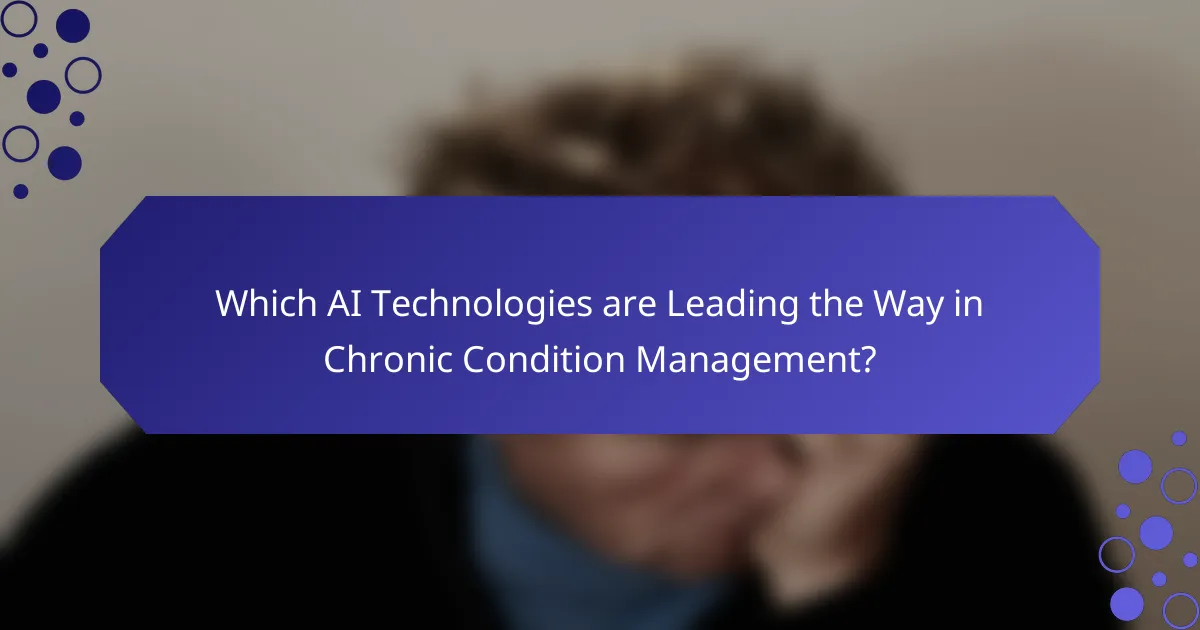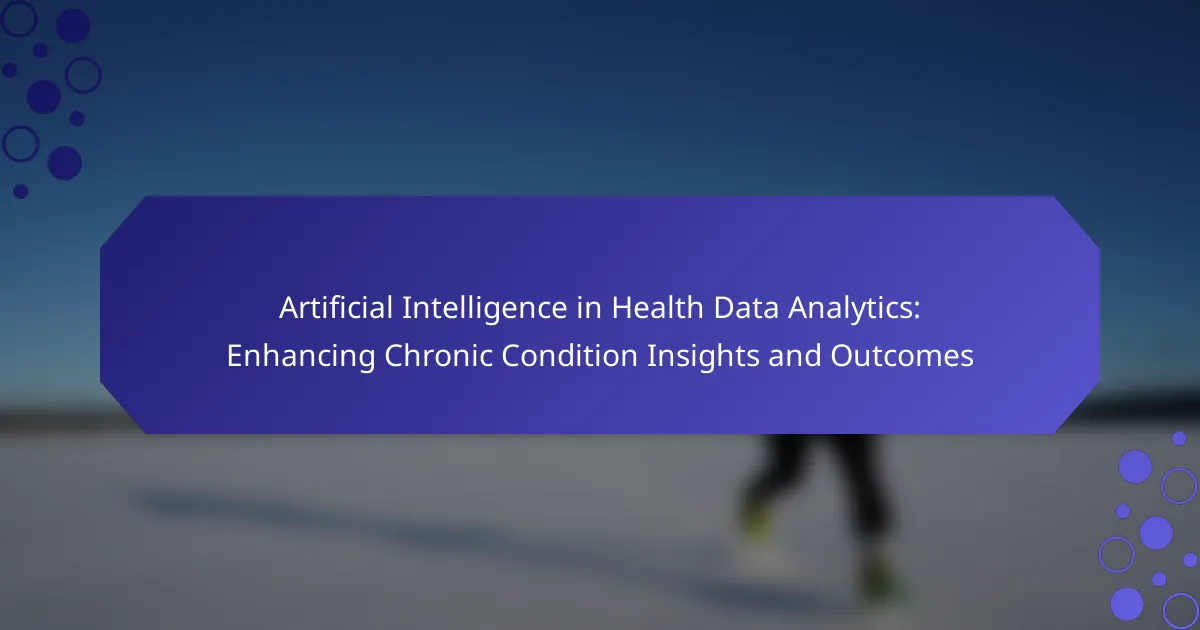Artificial intelligence is transforming health data analytics, providing deeper insights into chronic conditions and enhancing patient outcomes. AI algorithms predict disease progression and enable personalized treatment plans. These technologies facilitate real-time monitoring and improve patient engagement through tools like virtual health assistants. Addressing challenges such as data privacy and algorithm bias is crucial for maximizing AI’s potential in chronic disease management.

How is Artificial Intelligence Transforming Health Data Analytics for Chronic Conditions?
Artificial intelligence is revolutionising health data analytics for chronic conditions by enabling more accurate predictions and personalised treatment plans. AI algorithms analyse vast datasets, identifying patterns that inform clinical decisions and improve patient outcomes.
For example, machine learning models can predict disease progression, allowing for timely interventions. These insights lead to enhanced management of conditions such as diabetes and heart disease, ultimately reducing hospitalisations and healthcare costs.
Additionally, AI-driven tools facilitate real-time monitoring of patients, offering timely feedback to healthcare providers. This proactive approach supports better adherence to treatment regimens and lifestyle modifications.
As a result, the integration of AI in health data analytics empowers healthcare professionals to deliver more effective, tailored care for chronic conditions, significantly improving patient quality of life.
What are the Key Benefits of Implementing AI in Health Data Analytics?
Implementing AI in health data analytics significantly enhances chronic condition insights and outcomes. Key benefits include improved predictive analytics, personalised treatment plans, and streamlined data management.
AI algorithms analyse vast datasets, identifying patterns that predict disease progression, thus enabling early interventions. Personalised treatment plans are developed through AI-driven insights, tailoring therapies to individual patient needs. Furthermore, AI automates data management, reducing administrative burdens and allowing healthcare professionals to focus on patient care.
These advancements lead to better patient outcomes, increased efficiency, and cost savings in healthcare systems.
Which Chronic Conditions are Most Impacted by AI-Driven Insights?
AI-driven insights significantly impact chronic conditions such as diabetes, heart disease, and asthma. These technologies enhance patient monitoring, personalise treatment plans, and improve health outcomes. For instance, AI algorithms analyse vast datasets to identify patterns, enabling timely interventions. Chronic diseases often require continuous management, making AI’s predictive capabilities crucial in reducing complications and hospitalisations.

What Challenges are Associated with AI in Health Data Analytics for Chronic Conditions?
AI in health data analytics faces challenges like data privacy, integration issues, and algorithm bias. These obstacles can hinder effective insights for chronic conditions. Data privacy concerns arise from sensitive patient information, while integration issues stem from disparate health systems. Algorithm bias can lead to inaccurate predictions, affecting patient care. Addressing these challenges is crucial for enhancing AI’s role in chronic condition management.
How do Data Privacy and Security Issues Affect AI Implementation?
Data privacy and security issues significantly hinder AI implementation in health data analytics. Concerns about patient confidentiality and data breaches lead to stricter regulations, limiting data access. Compliance with laws like HIPAA complicates data sharing, impacting the effectiveness of AI models. Furthermore, inadequate security measures can result in unauthorised access, undermining trust in AI solutions for chronic condition insights. Addressing these issues is essential for leveraging AI to enhance patient outcomes.
What are the Technical Limitations of Current AI Models in Health Analytics?
Current AI models in health analytics face limitations in data quality, interpretability, and integration. These challenges hinder accurate insights into chronic conditions. Data quality issues arise from incomplete or biased datasets, affecting model reliability. Interpretability remains a concern as complex algorithms obscure decision-making processes, limiting clinician trust. Integration difficulties with existing health systems impede seamless data flow, restricting comprehensive analysis. Addressing these limitations is crucial for enhancing chronic condition insights and improving patient outcomes.

Which AI Technologies are Leading the Way in Chronic Condition Management?
Artificial intelligence technologies such as machine learning, natural language processing, and predictive analytics are transforming chronic condition management. These technologies enhance patient insights and improve health outcomes by analysing vast amounts of health data.
Machine learning algorithms identify patterns in patient data, enabling personalised treatment plans. Natural language processing interprets unstructured data from clinical notes, providing deeper insights into patient needs. Predictive analytics forecasts disease progression, allowing for timely interventions.
AI-driven tools improve patient engagement through chatbots and virtual health assistants. These technologies facilitate real-time monitoring, ensuring adherence to treatment plans and reducing hospital readmissions.
Overall, AI technologies lead the way in chronic condition management by leveraging data to deliver tailored healthcare solutions.
How do Machine Learning Algorithms Enhance Predictive Analytics?
Machine learning algorithms significantly enhance predictive analytics by improving accuracy and efficiency in health data analysis. They analyse vast datasets to identify patterns and trends, enabling earlier interventions for chronic conditions. Algorithms can process diverse data sources, including electronic health records and wearable devices, to provide personalised insights. This capability leads to better patient outcomes and optimised treatment plans, ultimately transforming chronic condition management.
What Role do Natural Language Processing and Computer Vision Play in Health Data?
Natural Language Processing and Computer Vision significantly enhance health data analytics by providing deeper insights into chronic conditions. These technologies enable the extraction of meaningful information from unstructured data sources, improving patient outcomes.
Natural Language Processing analyses clinical notes and patient records to identify trends and treatment effectiveness. For instance, it can detect symptoms and treatment responses, helping healthcare providers make informed decisions.
Computer Vision interprets medical imaging, such as X-rays and MRIs, facilitating quicker diagnoses and personalised treatment plans. This technology can identify anomalies that may go unnoticed, enhancing early detection of chronic conditions.
Together, these AI technologies optimise health data usage, leading to better management of chronic conditions and improved healthcare delivery.

How do Healthcare Providers Utilize AI for Improved Patient Outcomes?
Healthcare providers utilise AI to analyse health data, improving patient outcomes through enhanced insights into chronic conditions. AI algorithms process vast datasets, identifying patterns and predicting disease progression. This allows for personalised treatment plans and proactive interventions. For instance, AI can assess patient adherence to medication, enabling timely adjustments to therapies. As a result, patients experience better management of their conditions and improved quality of life.
What are the Best Practices for Integrating AI into Clinical Workflows?
Integrating AI into clinical workflows enhances efficiency and patient outcomes. Best practices include establishing clear objectives, ensuring data quality, training staff, and fostering collaboration among stakeholders. These strategies align AI capabilities with clinical needs, improving chronic condition management.
1. Define specific goals for AI integration, focusing on enhancing chronic condition insights.
2. Ensure high-quality, standardised data for accurate AI analysis.
3. Provide comprehensive training for clinical staff on AI tools and their applications.
4. Promote interdisciplinary collaboration to ensure AI solutions meet diverse clinical needs.
How can AI Support Personalized Treatment Plans for Chronic Patients?
AI can significantly enhance personalised treatment plans for chronic patients by analysing vast health data. It identifies patterns and predicts outcomes, enabling tailored interventions that improve patient adherence and health results. AI algorithms can process real-time data from wearable devices, offering insights into individual health metrics. This leads to proactive adjustments in treatment plans based on unique patient needs and behaviours. Additionally, AI facilitates the integration of diverse health data sources, ensuring comprehensive understanding and management of chronic conditions.

What are the Ethical Considerations of Using AI in Health Data Analytics?
Ethical considerations in AI for health data analytics include patient privacy, data security, and algorithmic bias. Ensuring informed consent is crucial as AI systems analyse sensitive health information. Transparency in AI decision-making processes enhances trust and accountability. Regular audits can mitigate biases that affect outcomes for chronic conditions.
How does Bias in AI Algorithms Affect Patient Care?
Bias in AI algorithms can negatively impact patient care by leading to misdiagnoses and unequal treatment. AI systems trained on biased data may overlook certain demographics, resulting in inadequate insights for chronic conditions. This can exacerbate health disparities and diminish patient outcomes. Addressing bias is crucial for ensuring equitable healthcare delivery and improving the effectiveness of AI-driven analytics in chronic disease management.
What Frameworks Exist to Ensure Ethical AI Use in Healthcare?
Frameworks ensuring ethical AI use in healthcare include guidelines focusing on transparency, accountability, and fairness. These frameworks promote responsible data usage and protect patient privacy while enhancing chronic condition insights. Notable examples are the IEEE’s Ethically Aligned Design, the WHO’s guidance on AI in health, and the EU’s AI Act. Each framework emphasises the importance of stakeholder engagement and continuous monitoring to mitigate biases. Implementing these frameworks can lead to improved patient outcomes and trust in AI technologies.

How is AI Shaping the Future of Chronic Disease Management?
AI is revolutionising chronic disease management by providing advanced data analytics capabilities. Through machine learning algorithms, AI analyses vast health data to identify patterns and predict disease progression. This enhances patient outcomes by enabling personalised treatment plans and timely interventions.
AI tools can process real-time data from wearable devices, improving monitoring of chronic conditions like diabetes and heart disease. For example, predictive analytics can alert healthcare providers to potential complications before they occur, allowing for proactive care.
Furthermore, AI-driven platforms streamline communication between patients and healthcare teams. This integration fosters better adherence to treatment regimens and facilitates patient education, empowering individuals to manage their conditions effectively.
The ongoing development of AI technologies promises to further enhance chronic disease management by integrating genetic and lifestyle data, leading to more precise and individualised healthcare solutions.
What Innovations are Expected in AI Health Data Analytics by 2025?
Innovations in AI health data analytics by 2025 are expected to significantly enhance chronic condition insights and outcomes. Key advancements include real-time data integration, predictive analytics for personalised treatment plans, and improved patient monitoring through wearable technology. These innovations aim to increase accuracy in diagnoses and streamline healthcare delivery. As a result, patients can expect better management of conditions like diabetes and heart disease, leading to improved quality of life.
How can Stakeholders Prepare for the Future of AI in Healthcare?
Stakeholders can prepare for the future of AI in healthcare by investing in data infrastructure and workforce training. Effective integration of AI relies on high-quality health data analytics to improve chronic condition management.
1. Develop robust data governance frameworks to ensure data quality and security.
2. Invest in training programmes to enhance staff skills in AI technologies.
3. Foster collaboration between healthcare providers and technology developers to align goals and expectations.
4. Monitor regulatory changes to adapt quickly to new compliance requirements.
5. Utilise predictive analytics to identify at-risk patients and personalise treatment plans.
What Common Mistakes Should Organizations Avoid When Implementing AI Solutions?
Organisations should avoid common mistakes like insufficient data quality, lack of clear objectives, and neglecting user training when implementing AI solutions. Focusing on these areas enhances chronic condition insights and outcomes effectively.
First, ensure data quality is high. Poor data can lead to inaccurate analytics and misguided decisions. Second, establish clear objectives that align with organisational goals. Ambiguous goals can result in wasted resources and ineffective solutions. Third, prioritise user training to empower staff in utilising AI tools effectively. Without proper training, the potential of AI solutions may not be fully realised.
Additionally, avoid underestimating the importance of stakeholder engagement. Involving relevant parties fosters collaboration and improves acceptance of AI initiatives. Lastly, regularly evaluate and iterate on AI implementations. Continuous improvement helps organisations adapt to changing needs and technologies, ensuring sustained success in health data analytics.
